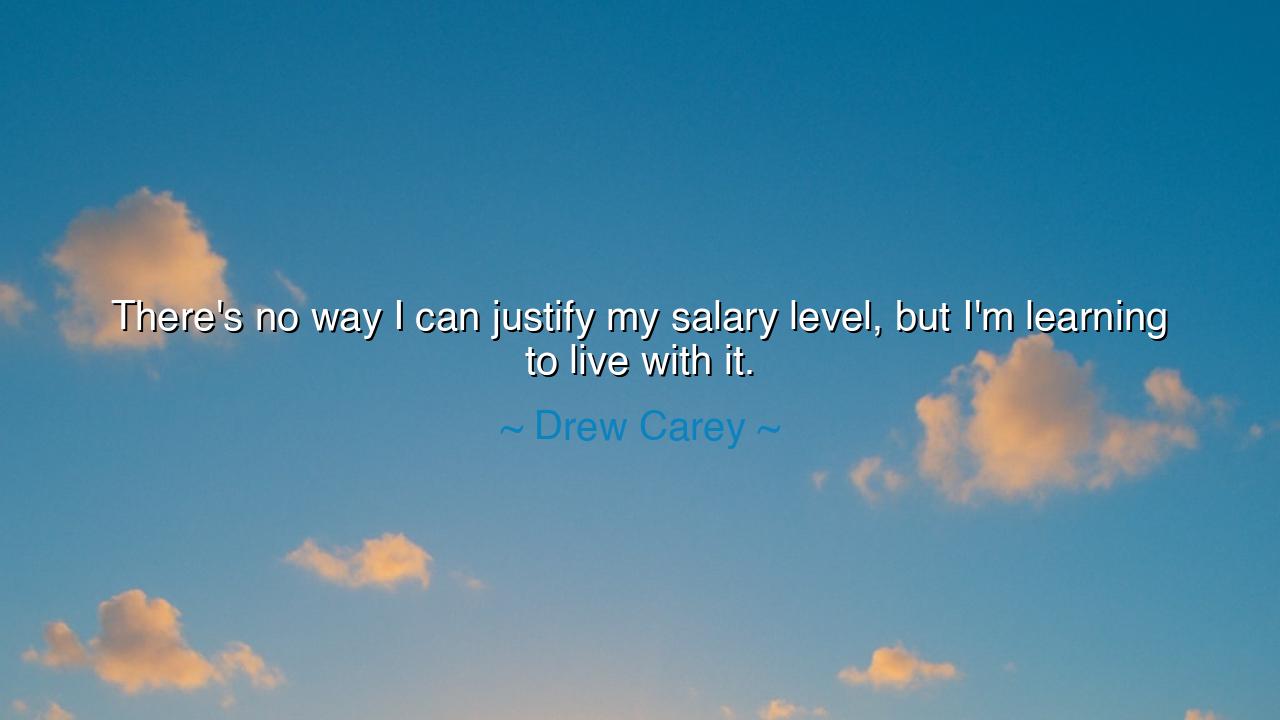
There's no way I can justify my salary level, but I'm learning to






“There’s no way I can justify my salary level, but I’m learning to live with it,” said Drew Carey, the comedian and host whose laughter filled the homes of millions. Beneath this wry confession lies a truth that resonates through all ages: that wealth and worth do not always walk hand in hand, and that humility is the proper response to unearned abundance. In his words, we hear the voice of one who understands both the absurdity and the responsibility of fortune. It is a confession of gratitude tinged with unease — the realization that in a world so unevenly blessed, one must learn not only to prosper, but to do so with conscience.
In the tone of jest, Carey speaks a profound moral lesson. When he says he “cannot justify his salary,” he is acknowledging that his material reward far exceeds what he perceives as the value of his labor. It is the same discomfort that visits every person who looks upon their blessings and feels the quiet question rise within: Why me, and not another? To learn to live with it is not to embrace greed, but to seek peace in gratitude — to recognize that one’s good fortune must be tempered with awareness, generosity, and humility. For it is not wrong to be rewarded, but it is folly to forget that reward carries with it the duty to give.
The ancients, too, spoke of this balance. The philosopher Seneca, though rich beyond measure, wrote, “It is not the man who has too little, but the man who craves more, who is poor.” And yet he also warned that wealth could be a test of character — that abundance reveals the soul’s true measure. To handle riches with grace requires the same discipline as to endure poverty with dignity. Drew Carey’s remark, though playful, echoes this Stoic wisdom: that prosperity demands humility, and self-awareness is the antidote to corruption.
Consider the tale of Andrew Carnegie, the steel magnate of the 19th century, who amassed wealth beyond imagination. Near the end of his life, he confessed that to die rich was to die disgraced. And so, he gave away nearly all his fortune to build libraries, schools, and institutions of learning — gifts that continue to serve humanity long after his passing. Carnegie, like Carey, recognized the tension between reward and righteousness, and he sought to bridge it through service. The lesson is clear: to live with wealth rightly, one must transform it from possession into purpose.
Carey’s honesty — “I’m learning to live with it” — also speaks to the lifelong struggle of reconciling success with humility. The ego hungers for validation, yet the spirit hungers for meaning. A man may earn riches through laughter, invention, or chance, but only wisdom can teach him how to bear them well. To “learn to live with it” is to accept one’s blessings without arrogance, to see prosperity not as proof of superiority, but as opportunity for good. The wise understand that abundance is not merely to be enjoyed, but to be shared — that generosity is the price we pay for fortune.
There is also a subtle truth here about self-knowledge. Carey admits his own limits — that he cannot rationalize or “justify” his reward — and in that admission, he reveals an integrity rarer than gold. The arrogant believe their wealth is evidence of virtue; the humble know it is a mystery. It is this humility that protects the soul from vanity and corruption. To “learn to live with it,” then, is not resignation but growth — the awakening of gratitude, the acceptance of responsibility, the surrender of pride.
Let this wisdom be a mirror for all who prosper in any measure. When fortune smiles upon you — whether through talent, inheritance, or luck — remember the unseen hands that helped you rise. Remember that your reward is not yours alone, but a trust from life itself. Use it to uplift others, to create beauty, to mend what is broken. Be generous in spirit, humble in heart, and wise in stewardship. For wealth, whether of money, knowledge, or influence, is fleeting — but the good you do with it endures.
Thus, the jest of Drew Carey becomes a timeless teaching: that wealth without humility is empty, but humility turns wealth into blessing. To live well is not to justify what you have, but to justify what you give. If life grants you abundance, do not shrink from it — but neither let it own you. Learn to live with it, as Carey did — with laughter, honesty, and gratitude — and let your prosperity become light for those still walking in shadow.






AAdministratorAdministrator
Welcome, honored guests. Please leave a comment, we will respond soon